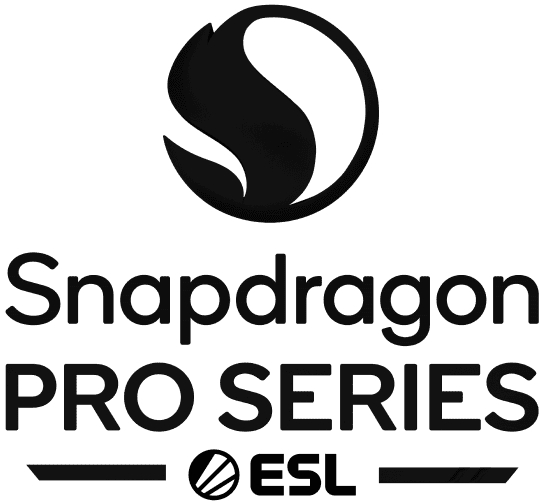Last month, we looked at the different types of ‘shoutcaster’, the initial setup and hardware required, and opening up a Twitch account. This month, we’ll dive right in to our first commentary broadcast, look at the four Ps (Preparation, Professionalism, Practice and Passion) and take a look at what knowing your game community means and how it can help you.
The first broadcast
So you have your software and hardware set up nicely, you’ve opened up an account on Twitch and your XSplit is just waiting for some juicy game content to flow through it: it’s time to find a match to commentate on.
First of all, stick to what you know and find a match from the game you play and know best. Ideally, pick a low key match, and not one from the upper echelons of the tournaments. That way, you won’t be so heavily berated for making mistakes or be given a hard time if someone doesn’t like your voice first time out. You should also find clans friendly and receptive to the idea of you covering their game - after all, who doesn’t want to be on TV?
To start with, just jump into a game, commentate it and record it for yourself. Do what you can in terms of commentating and don’t worry too much about anything else at this point. The first few commentaries you do will drastically improve every time provided you follow a few simple steps.
First, listen back and watch your first commentary before you do another one. Then pick out the things you liked, things you didn’t like (and be honest - it’s just you at this point anyway) and areas you think you can work on initially. Leave it a day or so, reread your notes on your first commentary and then find another match to cover. Do the same thing again, record it and watch it back while making notes. Do this three or four times and you’ll already hear how much better you’re getting each time.
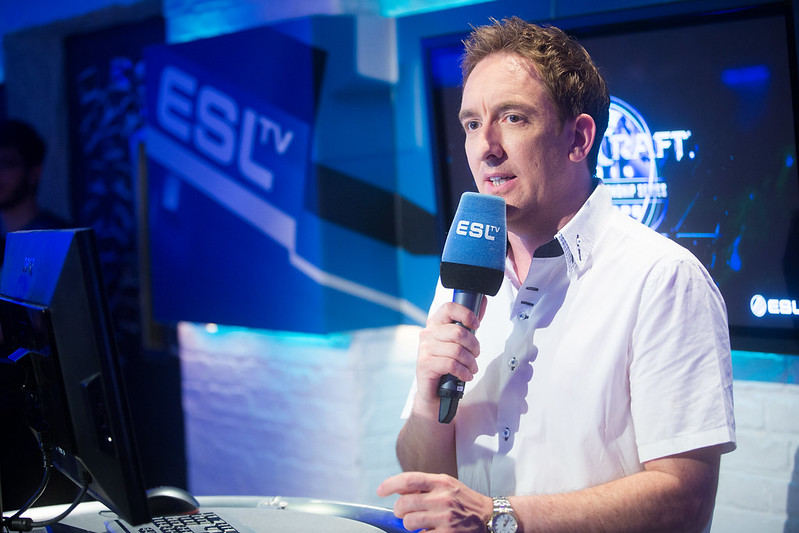
Going public
When you’re ready to go public (the earlier the better, but you need thick skin, too!), find your match ahead of time - a few hours, usually - and advertise your stream on social media, Reddit and anywhere you can find that runs community-based forums or sites for your game.
Your first public game also needs a little more depth than just your commentary, so ensure you collect some of the basics in terms of information before you go live. It will help you pad out the downtime and gaps in between maps:
- Tournament name and structure
- Which part of the tournament you are in (semifinals, league, group stage, etc.)
- The two teams lineups
- Some information on form
This is only really the bare basics, but it will get you up and running in your early commentaries. Once you’re more comfortable and have conquered some of the other skills, you can start to add better preparation (see later for more information on preparation).
If you get a one-sided game and it’s a blowout, that’s when your preparation becomes important to maintain the interest in the show. On a great game, it’s likely you won’t need 80% of your preparation, but don’t get into the bad habit of thinking “I won’t need it”, because one day you seriously will.
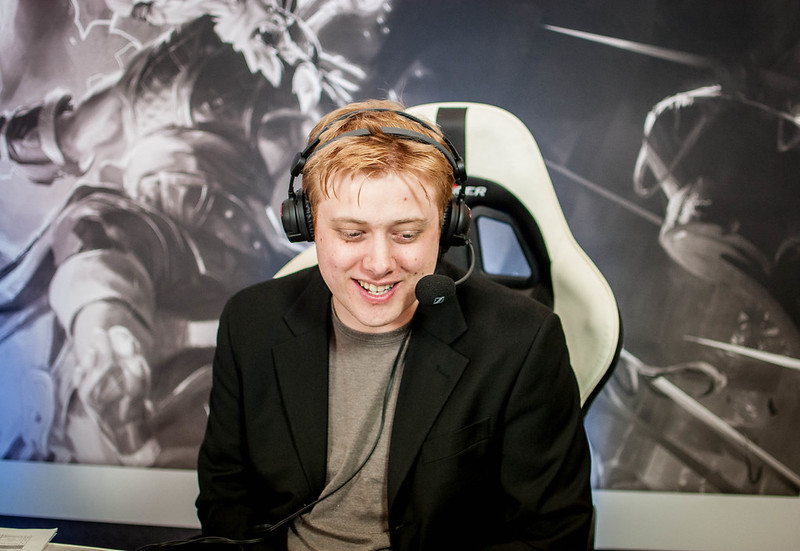
Teething problems
In the early days, you will absolutely fall into some of the more common pitfalls of the role. It’s totally normal, and you’ll learn more by ‘doing’ than anything else in those early weeks and months. Ask any experienced commentator and they will tell you how bad they were to start with, but how much they learned on the job by practicing.
I’ve listed a few of the more common things you might run in to in the early days in order to help you avoid or conquer them faster:
- Swearing - You’ll probably swear a lot to start with, but try not to if you want to succeed as a professional commentator - you’ll impress the 12 year olds but perhaps not those who are looking to hire you
- Calling the wrong play - You aren’t going to see every single play ever, so you’re bound to make a few mistakes. It’s fine, you’re new, but learn fast
- Overprojecting - A common issue for new commentators as they often try to inject an almost false level of excitement by being loud at the wrong moments. Focus on bringing as honest coverage as you can provide and over time you’ll understand when to project and at what points they are valuable
- Talking too much! - This is the most common problem for new commentators. Learning the art of ‘dead air’ makes a powerful commentator, but that’s for later. For now, just concentrate on taking a breath sometimes!
- Using the same words over and over - Another problem that comes up a lot, especially for non-native speakers, and not only for new commentators. The easiest way to get over this is to get a dictionary and a thesaurus (or use the online ones!). Write down the most common words you use for explaining things. Once you have a list of five to ten words, check them in a thesaurus and find some alternative words that can be used instead. Write ten words down that mean the same thing on a piece of paper and stick it to your monitor for your next game. Challenge yourself to use as many of them as possible. When you’re comfortable with all the words, change the note and add ten new ones (and so on)
You also need to be having fun. So go ahead, let your hair down and have some fun with the game, but remember to remain respectful of the players and teams competing - it’s an important match to them, even if you don’t think so.
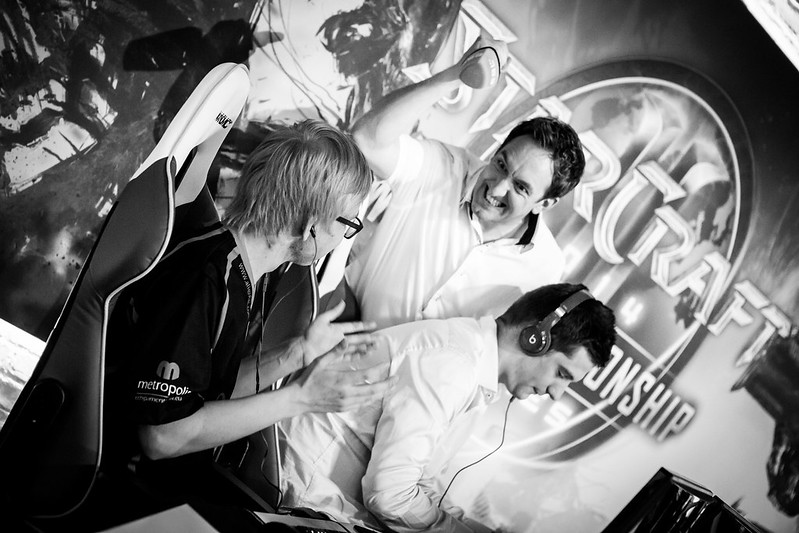
Likewise, interact with the people tuning in via chat or other messaging systems, wherever your listeners are (via webcam chat, for example). It probably doesn’t mean your cast would be bad if you didn’t, but it really adds to the value of the commentary when you can include people’s names from a chat window - people love nothing more than to hear their name mentioned. Got an opinion on something? Share it with your audience and encourage them to debate it in between the games - it really does help the quality of the cast for everyone, including yourself. Don’t be afraid of being controversial, but avoid being controversial for the sake of it - you will soon get found out as a fraud.
Handling criticism
Often you will get critique from people either during or after the cast, and frankly this is natural. If you don’t have the thickest skin and don’t take kindly to harsh critique, then this is probably not the job for you. However, there are things you can do to avoid or at least lessen the dent to your confidence, especially in the early days. You may find people say things like “Oh my God, you’re crap compared to <insert famous commentator’s name here>”. Comparison is understandable, especially if you cover a game that has had one particular caster attached to it for a long period of time. You’ll need to ignore most of these, although you can study those who people say are great and see if you can learn from them. Be careful not to clone them, though - you need your own personality!
Try to be selective about what you take on board. Read past the fanboy comments (good and bad) and look for those that offer advice from respected community members or other casters. You could even ignore Reddit posts, forums and news comments for a while until you’re comfortable in the scene you commentate in. You can’t run or hide forever, but those early few weeks can be very harsh on you unless you take some form of preventative measure to block some of the rubbish out.
And please, for the love of God, do NOT take anything in Twitch chat seriously. As much as it can be fun, it can also contain some of the most putrid bile of ‘feedback’, and rarely will it help you.
I could spend an age analysing why this occurs, but that’s not really important right now to you, the budding commentator. All you need to remember is why you started doing this in the first place. Eventually through numerous casts you will improve and grow to have your own fanbase of people who enjoy what you do for them or at the very least respect the time and effort you put in.
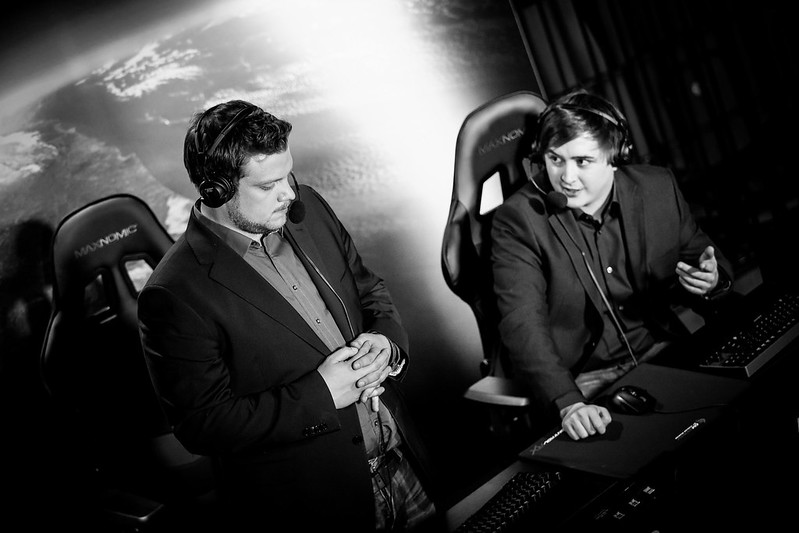
Learning from the experts
One of the best ways of learning from experts I found early on was to listen to sports radio broadcasts. It actually doesn’t matter too much which sport, but try and find something that has the same kind of pace. Football (or soccer) worked for me. Those on BBC Radio 5 in particular offer excellent insight into the world of radio broadcasting. Listen to the way they explain things, their energy, their pace, how they interact with their co-commentator and how they bring in the action and do hand-offs (throws).
I learned more from listening to this style of commentary than anything in esports could offer me.
Obviously, commentating in your home is very different from doing the same thing for a large televised show like LCS or WCS, and even more removed from a tournament event like Intel Extreme Masters or ESL One in a huge stadium. But that’s for a later chapter!
At this point, you need as much help as you can get, regardless of where you think you are in your progress. Help comes in the form of advice from your peers and fellow broadcasters (who are likely to have felt just like you do when they first started). It also comes in the form of reading books on TV production (particularly sports production), biographies of professional sports commentators (I can particularly recommend Murray Walker’s biography and John Motson’s, too, to learn more about preparation) and watching plenty of varied sports and listening and watching how the commentators work.
You can, fairly inexpensively, enroll in a local college course, either full time or, like I did, part time in the evenings for a few weeks. A general media course is enough for most, but you can take it to degree level if you are academically minded. In fact, a number of commentators run media degrees alongside working for a games broadcaster, and the two help each other.
It might be that you take to it easily and none of the above will apply to you, in which case, great - you’re probably a natural born show-off, and that’s pretty cool for the job you just chose!
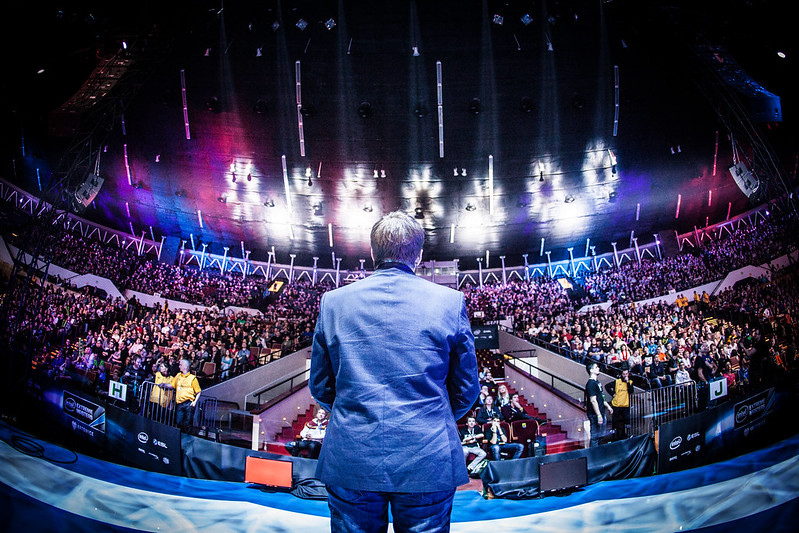
The keys to success on any format
Regardless of whether you’re broadcasting on TV, video, audio or any other format past, present or future, there are several things that you can do to ensure a successful cast each and every time. In fact, I have developed my own little mantra that I use every time regardless of how big the job is. This has come to be known as “the four Ps”.
Preparation
As I explained earlier, preparation is the first key to a great cast. It doesn’t make the cast great on its own, and in fact it usually won’t have any impact on the cast being great at all - it’s usually how exciting the game itself is that decides how great it was. However, lack of preparation will almost certainly make a great game a bad cast, and a terrible game even worse.
Remember the viewer or listener is relying on you, and will often put a lot of faith in you for information on the players, the teams, their backgrounds and the stories around them. They’re relying on you to make these virtual characters come to life, and for you to humanise what, to the outsider, looks like a very non-human sport.
To do this, you will have to spend the time required researching the match or tournament ahead. You also have to be 100% sure what you are about to say is 100% correct - again, your integrity will be heavily damaged if you say something that simply isn’t true. Sure, we all make mistakes, but without preparation, you will make more mistakes and be taken less seriously. Eventually you won’t be trusted at all, and that’s about as bad as it gets as a commentator.
It’s especially important to prepare if you are a colour commentator, and in some ways you will need to go ever deeper than the play-by-play guy as viewers will be expecting you to tell them something they don’t know. The other guy just has to explain what’s going on!
I was once told that it’s better to say nothing at all than say something you’re not sure about. In other words, say what you have to say with total conviction, even if it ends up being wrong - at least it will then be seen as a genuine mistake. There’s nothing worse than a commentator saying “I think that’s right” - it either is or it isn’t, and if you’re not sure, you shouldn’t be saying it anyway.

Preparation comes in many forms, and how important it is will also vary on the type of role you perform at an event and how good you are at retaining information yourself.
Roughly speaking, you should be preparing for the following items:
- Team and player information, lineups, player names, nicknames, ages, etc.
- Team and player statistics, wins, losses, trends, form, tables, results, etc.
- Tournament information, structure, prize money, entry system, qualification results
I’ve included a recent spreadsheet I used to prepare for a big tournament so you can see the various tabs and perhaps use this as a base for your own preparation. Check it out here.
What you’re also looking for in all of this information is storylines. You can find many golden nuggets if you do your preparation right. It could be you find a team has never lost using a particular strategy or hero or champion. You might find a winning or losing streak of matches for a player or team. You could find they’ve never beaten or lost to the team they’re about to play, and all of these things on their own or collectively invite a story line that allows people to understand the magnitude of what they are watching. It also helps people who are mostly neutral choose a team or player to root for, making it more enjoyable for everyone.
Some of the biggest matches in other sports are those which have one or more of these storylines involved. If you’re an NFL fan, you’ll no doubt be aware when any team gets to the end of the season that the ‘perfect season’ is pulled out as a storyline. In 1973, the Miami Dolphins became the only team in history to have a perfect season, not losing a single match. Brazil about to win a third World Cup was a story in its own right, one made even more remarkable by the fact they became the first to achieve that success. The added story was that they got to keep the first version of the World Cup, too.
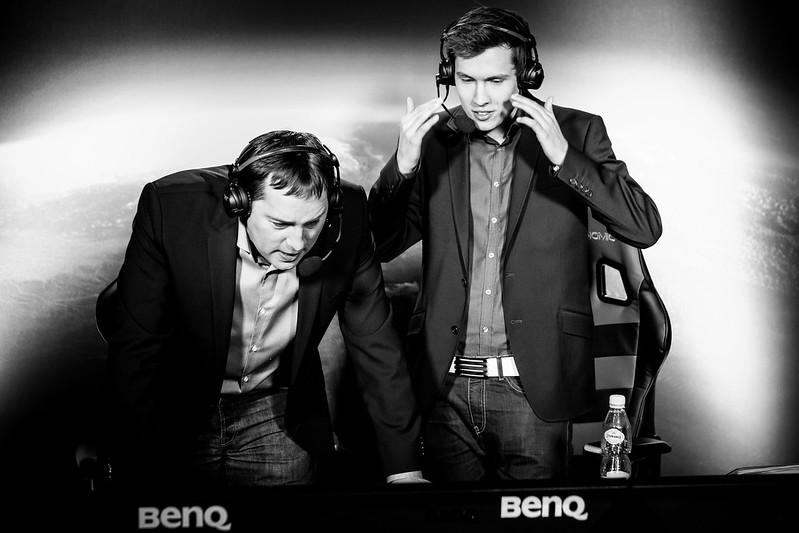
It’s storylines like this that separate the ordinary or good games and turn them into amazing ones that people remember for a long time, and it’s partly your job to find these and put them out there in the community. You’ll be amazed by how far some of them travel and help hype a game, ultimately making your job even easier!
Game-specific preparation
If you are attending an event where you haven’t covered the game before, you will need a lot more preparation, but it’s specifically learning the game and the community.
I’ve developed something of a regime which allows me to get a basic underlying understanding of the game in question. It also allows me to then use my experience to complement it, and often means I can commentate on almost anything to a reasonable standard right off the bat. Practice makes perfect, though, and we’ll talk about that soon, too, but for now, concentrate on the following if you want to learn a game to the point where you can commentate on it.
- Play the game!
- Depending on the depth of the game, learn as much as you can about it - maps, champions, units, heroes, etc. Read up and watch tutorials to help you learn them faster and make notes as you go
- Learn the strategies and try them out for yourself against other players. You aren’t expected to be a top player within a few weeks, but you need to understand the plays
- Get involved in the community. Find out where people hang out and talk about the game, and in particular the esports part - official game forums, community websites, Reddit and Twitter are particularly good for this
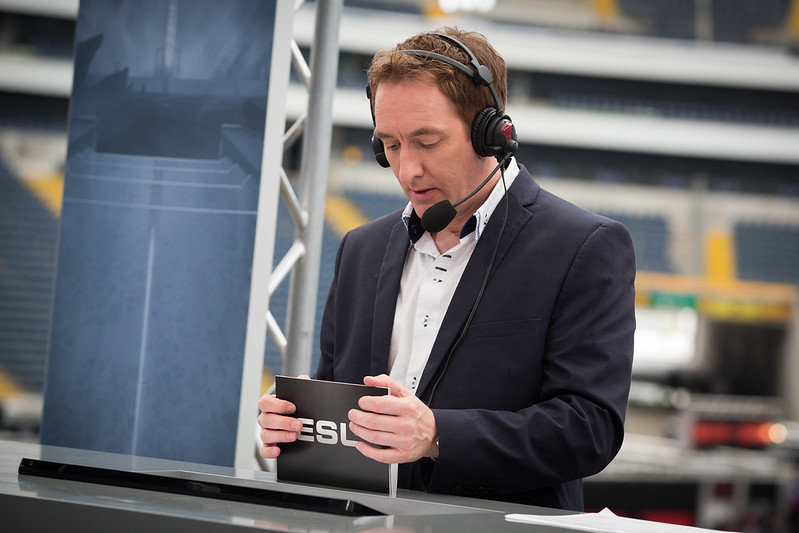
How long this will all take depends on how deep the game is and how long it’s been around. If you suddenly decide to get involved in an existing game like StarCraft or Dota 2, it will take you a lot longer than a new game that just came out. You will have to invest hundreds of hours of game time to be very good and ready to commentate on it, but a new game may be something you can jump in on almost right away, so if you can, pick your game carefully. It also helps if you have experience playing another game in the same genre as you can generally use your experience of that game to good effect in the new one, cuttings some corners and saving you some time.
Once you have a basic grounding, though, get commentating and learn as you go along - nothing beats actually doing it! As you go along, you will also learn more depth and start to put some ‘meat on the bones’. There are also some techniques available to you to aid preparation, but not replace it. I will usually have a large binder on my desk while commentating which contains all the information I have collected on a player, but in a very short format and easy to navigate, also including a photograph so if the player pops up on screen I can easily identify them. I also use my laptop to display my stats, which is usually something I put together on a spreadsheet before the tournament. Make sure you double check your stats with someone else, too, as blurting out a stat on air that everyone watching knows is wrong is going to make you look like an idiot.
The final piece of preparation, particularly true if you are attending a very international event, is to check on pronunciation of player names. If in doubt, ask the player directly. All too often this is overlooked and a commentator says a nickname or real name completely wrong until corrected half way through a show or cast. There is nothing more embarrassing to you or the player concerned. Again, it will add weight to the viewers’ impression that you have no idea what you’re talking about!
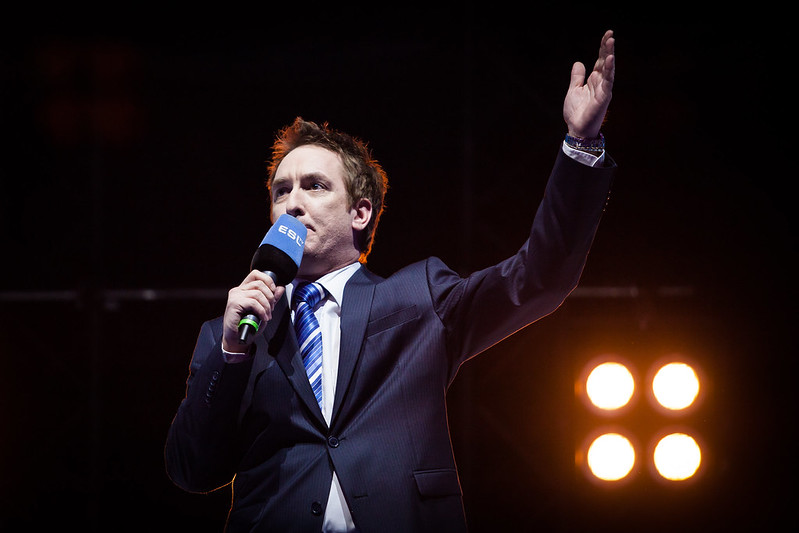
Practice
There is a famous gamer who swears by the mantra “practice, practice, practice”, and while it’s only one of my Ps, it’s no less important when it comes to commentating. Practice when and wherever you can, either live or back to friends or family. Work on your pronunciations, work on your phrases, and don’t be limited to just a few of the same adjectives in explaining the action - use the thesaurus tip explained earlier in the chapter to expand your vocabulary. If you really want to succeed and you have the voice and the personality for this kind of job, practice is probably all you need to get good at it, so stick with it, even if you’re being battered by the often overly critical gaming communities.
Passion
Never lose sight of why you wanted to do this job. Passion is as important in commentating as preparation is. You can spend two months preparing for a tournament and know every single thing about someone, including the color of their dog and their inside leg measurement, but if you aren’t passionate about the games or players or teams or league, you aren’t going to come across that way either. How can you possibly expect to enthuse others about gaming if you aren’t enthused yourself?
It is, as I see it, one of the fundamental reasons I commentate, and also a responsibility that I feel in my own small way that I can spread the passion of gaming and esports to others outside it, to enthuse them through my own enthusiasm, as it were.
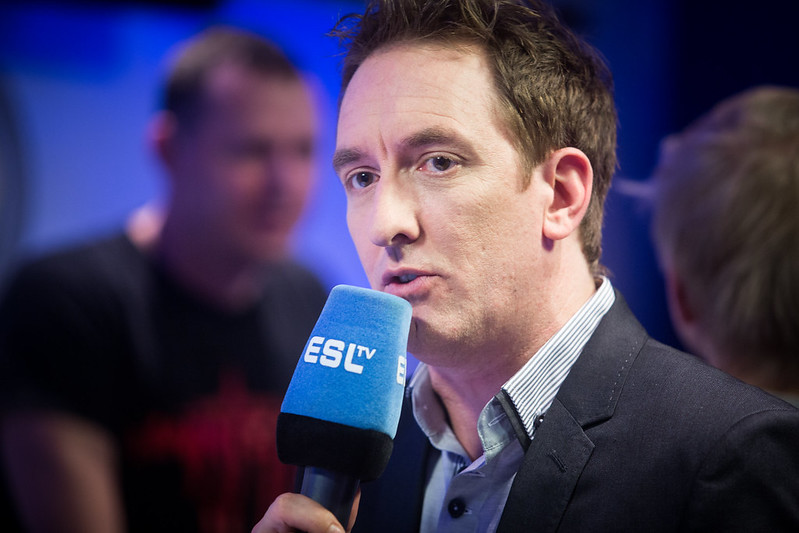
Professionalism
My final P is an obvious one, but probably the least adhered to in gaming broadcasters (except perhaps by the top guys who are already full-time commentators). If it’s not obvious to start with, let me put it in black and white. In everything you do, in everything you say and in every type of event regardless of size or the broadcast format it’s going out on, you should be professional. That extends from what you say on live TV to what you say on an audio broadcast from your bedroom.
Sure, there are others out there swearing and cursing as if it’s second nature, but I don’t see commentators doing that in any sport I watch on TV. It can also be seen as cool, especially to such a young and highly influenced audience, but it depends on what you want to do with this. If you’re out to gain some e-fame and make a small name for yourself, sure, going on an audio cast and swearing at all the players is going to making you look cool to all the 12 year olds, but if you really want to be taken seriously in this business and go on to have a career in it, it probably won’t.
Likewise, being professional doesn’t mean you can’t have fun on air - you really should be having fun or there’s little point in doing it in the first place. Shows are a little different, too - I’m talking about commentating here, and when it comes to shows, if you play a sound up front that explains there’s going to be strong language in it, it’s probably fine, but just remember: it’s not big or clever to go on air and swear for the sake of it.
You may also consider this: as an industry, video game broadcasting is very, very small. There are only a couple of dozen full-time professional commentators in the western world. While all of us want it to grow and allow others to become full-time salaried commentators, we also need to remember that every one us has a responsibility to help grow the entire industry of competitive gaming. To do that, we need to be as professional as the lack of money will allow us, and work together to aid the entirety of gaming and gaming broadcasting to grow to the point that we have many more casters on TV and in high-production works, not just a few.
Next month, we’ll take a deeper look at your voice - or rather ‘the voice’ - and how you can improve your own. I’ll also explain event broadcasting and working with cameras in more detail as well as compare natural talent to hard work.
Click here for the first part of how to become an esports broadcaster.







